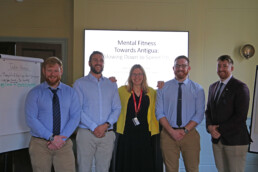Research and impact | By Hamish Armstrong
Impact: Mindfulness in the military
Team-based mindfulness versus meditation in the military
A new practitioner report by The Institute of Employment Studies (IES) and Cranfield University has found team-based mindfulness training to be more beneficial than meditation in the military. The report titled Mindfulness in the Military, is the culmination of a three-year study commissioned by the Defence Science and Technology Laboratory. It investigates if and how mindfulness can be leveraged for strategic benefits and if team-based mindfulness training can help individuals and teams in defence to improve mental fitness and change-readiness.
Dr Alison Carter, Principal Research Fellow at IES says “being change-ready in a complex and uncertain scenario means being resilient, agile and constantly learning, all qualities that mindfulness can actively encourage in an individual but more significantly in teams”.
The findings of the study suggest that the intended culture change towards individuals and entire teams in managing stressful challenges successfully, may be feasible through a new type of team-focused mindfulness training, but not through conventional mindfulness programmes focused on individuals learning to meditate.
Dr Jutta Tobias Mortlock, Senior Lecturer at City, University of London, says “mental resilience depends much more on social factors than we thought initially. Mindfulness as a team sport is more than people meditating together, it is about a mindset shift from a me-focus to a we-focus”.
The academics recommend that the military should consider mindfulness as a team activity and train groups systematically to anticipate and respond to stressful situations together, thereby learning to create collaborative solutions to demanding challenges at both intellectual and emotional levels.
The study reveals that in organisational cultures such as in the military where a can-do attitude, self-sacrifice and emotional stability are highly valued, there is a tendency to practise mindfulness mindlessly because of the negative connotations of self-help. In addition, mindfulness educators without formal mental health training may do more harm than good in such contexts, especially if they focus on training individuals to engage in prolonged periods of quiet meditation, common in more traditional, individual-focused mindfulness programmes such as Mindfulness Based Stress Reduction. This is because sitting in silence for 20 minutes or longer may unearth latent trauma and in unexpected ways, particularly in military populations.
Mindful submariners embark on Atlantic rowing challenge
HMS Oardacious team develops essential mindfulness techniques with support from City’s Centre for Excellence in Mindfulness Research (CEMR).
In January, four Royal Navy Submariners became the fastest team of serving military to row unsupported across the Atlantic Ocean, arriving at Nelson’s Dockyard in Antigua just 37 days, 6 hours and 40 minutes after departing from the Canary Islands in mid-December.
HMS Oardacious was among the 35 teams to take on the Talisker Whisky Atlantic Challenge.
In preparation for their challenge, team members Lt Hugo Mitchell-Heggs, Lt Callum Fraser, Petty Officer Dylan Woods and Leading Engineer Technician Matt Harvey undertook a mindfulness workshop with Dr Jutta Tobias Mortlock, Co-director of the Centre for Excellence in Mindfulness Research at City.

Dr Mortlock says that the team’s willingness to share their innermost thoughts and worries ahead of the expedition led to a highly productive session. “We have been engaged in a research partnership with the Royal Navy on mindfulness and mental resilience and it has been my privilege to facilitate a mental fitness workshop for the four crew members” she says.
“These courageous men were unafraid to share their hopes and fears about their challenge of a lifetime. We discussed and practised together mindfulness-based pathways towards sustaining their resilience along their journey”.
Lt Hugo Mitchell-Higgs thanked Dr Mortlock on behalf of the team for the opportunity to share their thoughts and for help with conquering any mental barriers. He says “we are incredibly grateful to Jutta and the City, University of London team for their support and expertise. They helped the HMS Oardacious team develop essential mindfulness techniques that will lend themselves to the success of our epic Atlantic crossing both as individuals and as a team”.
Leading Engineer Technician, Matt Harvey, echoed his colleague’s sentiments while pointing out the likely challenges the team would face.
“Our culture as submariners seems like the perfect preparation for the Talisker Whisky Atlantic Challenge”, he says, “whether it is knowing everything there is to know about our boat, looking out for our teammates or managing watch systems all while contending with sleep deprivation and dealing with the emotions of leaving our loved ones”.
Sylvia Woods, Grandmother of Dylan Woods, was there among the spectators when the team embarked upon their voyage.
“We are so, so proud of the boys. They are a great team and I have been told to prepare their bangers and mash on their return” she says.
The team helped to raise £125,000 for the Royal Navy and Royal Marines Charity to support with the mental health and wellbeing of submariners.